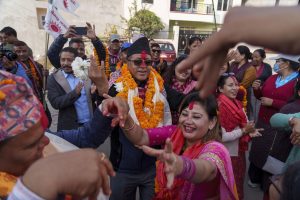Nepal is less than two days away from voting in federal and provincial elections. Campaigning for votes ended at midnight on November 17, and the country has entered a cooling-off period before voting on November 20.
The primary contest is between the ruling coalition led by Prime Minister Sher Bahadur Deuba of the Nepali Congress (NC) and the opposition coalition led by former Prime Minister Khadga Prasad Sharma Oli of the Communist Party of Nepal-United Marxist Leninist (CPN-UML). This election has marked a surge in independent candidates challenging the old guard, which has traditionally dominated Nepali politics, in ways never seen in the past.
Since 1990, when Nepal became a multi-party parliamentary democracy it has had 28 governments led by 14 leaders. Deuba has held the post of prime minister for a record five times, since his first stint in 1995. Though parties and politicians compete fiercely against each other in elections, shared interests, which include power and business contracts, do see them join hands from time to time.
New political forces have entered politics in recent years only to become clones of the older parties. Consider the Pushpa Kamal Dahal-led Communist Party of Nepal-Maoist Center (CPN-MC), for instance, which entered mainstream politics in 2006, after waging a 10-year insurgency. Today, it is no longer distinguishable from the other mainstream parties.
Over the decades, Nepal has gone through major political transformations. It experimented with multi-party democracy, an absolute monarchy and a constitutional one, republicanism, and federal republicanism. While the system changed, the actors remained the same.
At the same time, governance has gone from bad to worse. Corruption has become institutionalized. Political ideology is in a coma, replaced by petty self-interest. Power is no longer the means but a goal in itself.
This has led to extreme frustration among the people.
The Nepali people have embraced political change and newer political forces in the hope of better governance. They gave a chance to the CPN-MC and made it the largest party in the first elections that it contested after the insurgency, hoping it would provide better governance. They also gave the grand-left alliance in 2017 a chance. Unfortunately, both did not deliver the goods.
When they were not presented with new options, they chose between the two “known devils” – the NC and the CPN-UML.
Elections to local bodies in May this year were a game-changer. Forty percent of the candidates in the election were between 21 and 40 years of age. The election of Balendra Shah, a young and independent candidate, as Kathmandu’s mayor shook the establishment to the core. Shah’s opponents and analysts had dismissed his candidacy. But the lackluster performance of the previous mayor of the CPN-UML, poor candidate selection by the mainstream parties, and innovative and disciplined campaigning by Shah’s supporters propelled him to power against all odds.
Shah’s victory in the local polls has prompted several independent and young Nepalis to throw their hat in the ring in the general election. They are challenging the old guard.
Sagar Dhakal, a 31-year-old engineer, is running against Deuba in the latter’s home turf. Initially, Deuba was dismissive of Dhakal’s candidature and did not bother to campaign. Meanwhile, Dhakal engaged voters directly on the ground.
With Dhakal evoking remarkable enthusiasm, even among older voters, a worried Deuba rushed to his constituency to campaign. He can no longer take the constituency, which elected him in every election since 1990, for granted.
Similarly, Deuba’s alliance partner, Dahal is contesting this time from a new constituency – Gorkha, instead of his hometown in Chitwan. The former Maoist leader, who is often referred to by his nom de guerre Prachanda or “fearless one,” has given his decision to shift constituencies a positive spin. He claimed that the decision emerged from a position of strength, i.e. he can win from any constituency. His opponents, however, allege that he “ran away” seeking a safer constituency.
Young, independent candidates with no background in politics are giving the mainstream parties’ candidates a run for their money. Senior NC leaders such as Prakash Man Singh and Gagan Thapa are not assured of victory in the capital. There is similar competition in some other urban centers.
Second-tier leaders from the mainstream parties, especially in urban areas, are facing a stiff challenge from political novices. These include former Lumbini province Chief Minister Shankar Pokharel, Vice Chairman of the Planning Commission Bishow Paudel and prime ministerial aspirant Gagan Thapa.
Mainstream political parties are projecting confidence before the public but express concern in private.
This is not to suggest that the independent candidates will overthrow the existing political order or come to power. On the contrary, the NC and CPN-UML are still favored to emerge as the two largest parties. However, candidates cannot take their victory as a given.
The challenge from the young candidates has forced the older, mainstream politicians to introspect. It has pressured them to go to the voters directly and engage them. Besides, if some challengers win, it will break the existing self-serving cartel between the mainstream parties. Also, a loss for any of the party supremos will send chills down the spine of all others.
Victories, or even a close run, for some independent candidates, will send a strong message but will not upset the current order. In a parliamentary system, parties are essential. It is more so in Nepal, where the national parties can use a whip that requires parliamentarians to vote along party lines or face a penalty, and parliamentarians hardly defy party lines.
This election is pivotal. In the lust for power, parties have sidelined ideology. Will the voters sideline traditional party/voting affiliation in their desire for good governance? We are about to find out.

































